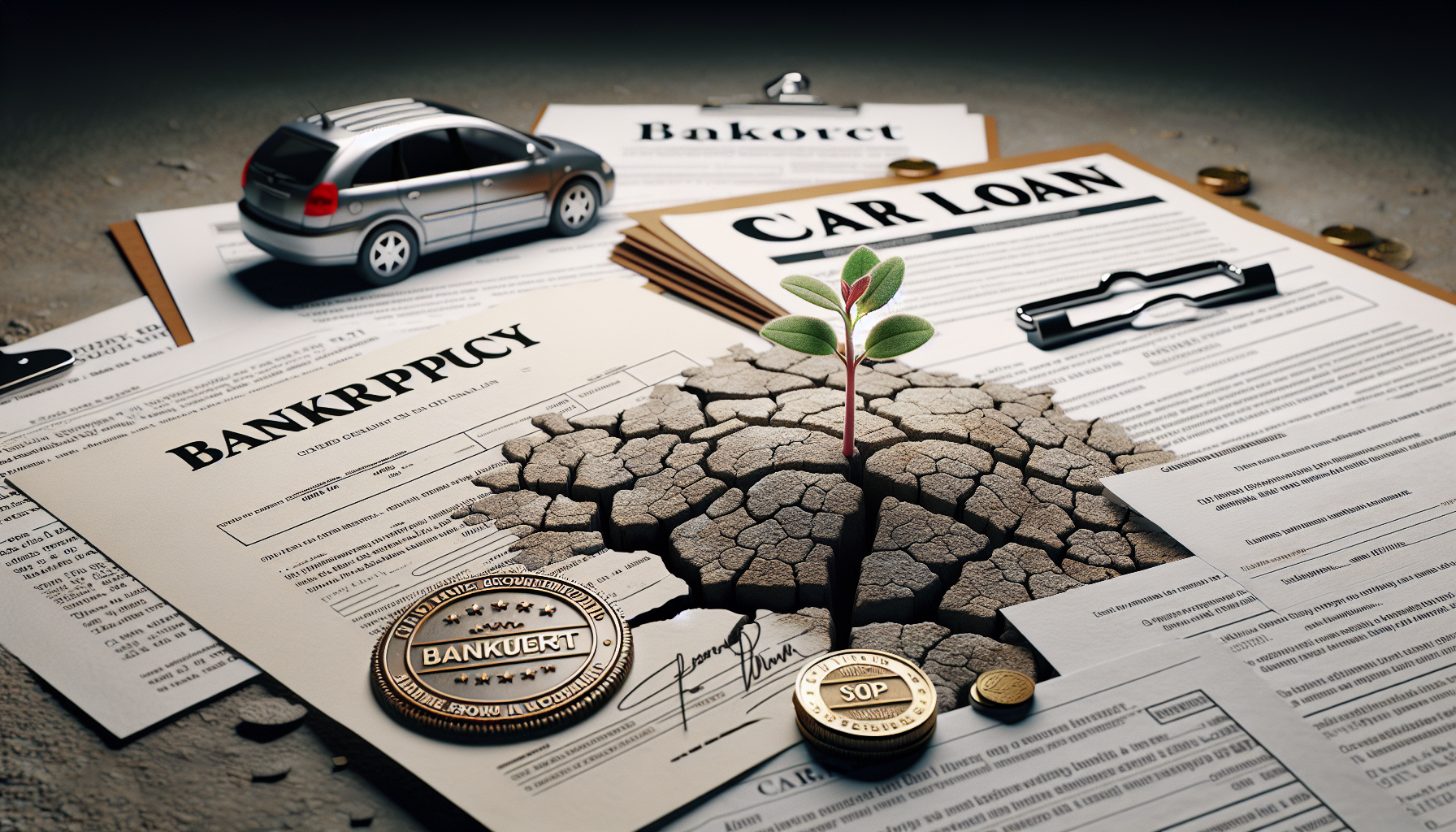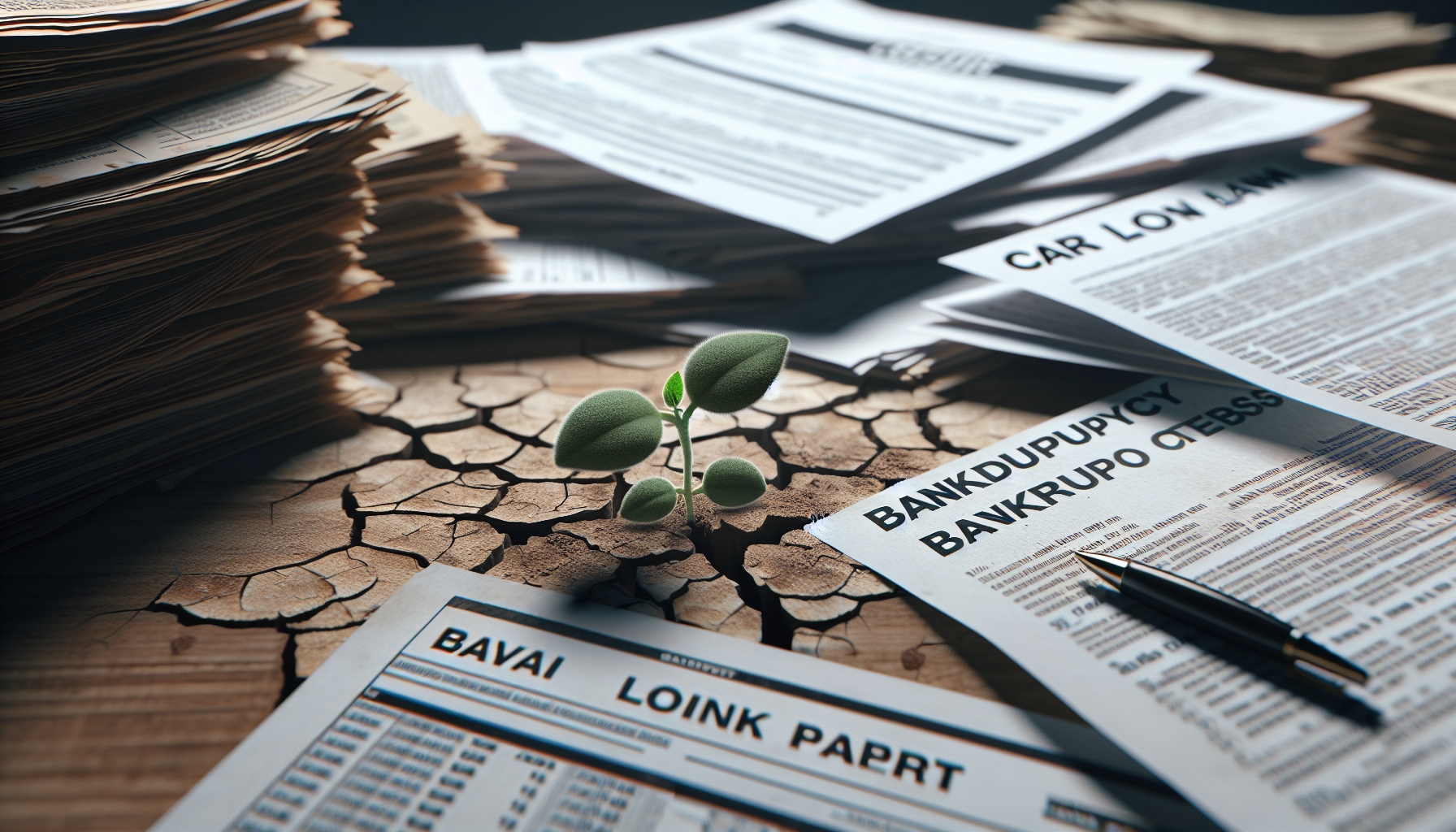
Navigating the challenging intersection of bankruptcy and vehicle financing can be a daunting journey, especially for those grappling with financial distress. The impact of bankruptcy often translates to profound transformations in one’s financial life, with obtaining vehicle financing becoming a notable challenge.
Insolvent auto loans, a significant concern for individuals dealing with bankruptcy, are viewed skeptically by many lenders, making the process far from straightforward.
But here’s the good news: financial recovery and debt relief are a shining beacon that lights up this seemingly dark tunnel.
Bankruptcy doesn’t signify the end of your journey towards financial stability; it may indeed serve as a new beginning. There’s a silver lining, showing that acquiring a car loan post-bankruptcy is not an impossible feat. Such concepts as debt relief, vehicle financing, insolvent auto loans, and financial distress are all key factors in a Chapter 11 bankruptcy process.
Understanding Bankruptcy and its Impact on Car Loans
Bankruptcy, often seen as a financial plunge, can deeply affect an individual’s financial stability. The Chapter of their bankruptcy plays a significant role when someone files for it; their credit report is negatively affected, making securing auto loans difficult.
Amid such predicaments, individuals often resort to bad credit car loans, ensuring they can still afford a vehicle.
With the two main types of bankruptcy, Chapter 7 and Chapter 13, there are different repercussions for car owners.
Chapter 7 bankruptcy leads to a complete discharge of debts and commonly necessitates the surrender of assets. In contrast, Chapter 13 bankruptcy introduces a loan modification opportunity, permitting debtors to spread their repayments over time, bringing an avenue for credit repair.
Despite their unique processes, both types of bankruptcy significantly impact automotive financing possibilities. It’s important to remember that bankruptcy doesn’t mark the end of owning, it merely marks a Chapter in your financial journey, requiring credit repair, loan modification, potential bad credit car loans, and financial counseling to rebuild and move forward.

Exploring Debt Relief Options for Vehicle Financing
Delving into the realm of vehicle financing can indeed pose substantial challenges, chiefly when bankruptcy is in the picture. Vehicle financing or ‘auto loan debt’, involves securing funds to buy a car often leading to substantial secured debts.
Crucially, these debts have your car acting as collateral.
The introduction of bankruptcy can disrupt existing vehicle financing plans, necessitating the exploration of debt relief options.
Bankruptcy might pave way for the discharge of certain debts, but as auto loans fall under the category of secured debts, they function differently.
Importantly, even amidst bankruptcy, restructuring options exist that could enable you to retain your vehicle.
Modifying your car loan agreement, or even using certain lawful provisions can prove instrumental in keeping your vehicle while simultaneously attending to bankruptcy proceedings.
Following bankruptcy, steps towards securing your car financing could involve a diligent reconstruction of your financial health. One such method includes restructuring, discharge, debt consolidation, auto loan debt, and secured debts.
Navigating Financial Distress The Role of Insolvent Auto Loans
Journeying through the maze of financial distress, particularly in the face of insolvent auto loans, categorized as unsecured loans, can seem an overwhelming challenge. These loans, born out of financial hardships or inadequate financial management, have a significant credit score impact.
This can pose formidable hurdles in securing viable financing in the future.
Despite this, it’s critical to remember it’s not a dead-end.
There exist effective strategies to counteract these financial predicaments. One highly advocated strategy is to craft a robust debt repayment plan.
Meticulously designing such a plan is an instrumental step in reclaiming control of your finances. Notably, it has served as the bedrock for success stories where individuals have secured a postbankruptcy car loan.
The wake of financial distress calls for an intensified focus on rebuilding one’s financial fitness. This recovery could entail seeking proficient debt adjustment, exploring options around unsecured loans, understanding the credit score impact, implementing a solid debt repayment plan, and even considering a post-bankruptcy car loan for personal transportation.
Credit Repair Strategies After Loan Default
Experiencing loan default is undeniably a financially distressing circumstance, leading to a perilous scenario of financial insolvency. Its aftermath often devastates, especially when it impacts your credit score and drives you towards bankruptcy.
Bankruptcy, a distressing outcome of substantial legal debt elimination, often comes as a result of loan defaults.
Among these, subprime auto loans pose a significant challenge, with bankruptcy proceedings further complicating their repayment strategy.
To embark on a journey towards credit repair after loan default, a thorough examination of your credit report is necessary. This analysis involves pinpointing potential report inaccuracies.
Having a clear understanding of how to legally dispute these errors plays a crucial role in this process.
In addition, budgeting is a vital part of the financial reorganization that follows a loan default. By combining a carefully planned budget with an efficient debt repayment strategy, one can move towards legal debt elimination, prevent financial insolvency, and reorganize subprime auto loans, ultimately leading to successful debt liquidation.
| Financial Distress | Recovery Measures |
|---|---|
| Loan default leads to financial insolvency | Thorough examination of credit report helps in credit repair |
| Subprime auto loans often lead to bankruptcy | Legal dispute of report inaccuracies aids in credit repair |
| Bankruptcy is a distressing outcome of substantial legal debt elimination | Combining a carefully planned budget with an efficient debt repayment strategy prevents financial insolvency |
The Reality of Bad Credit Car Loans What You Should Know
Navigating the world of car finance after insolvency can indeed be daunting. Comprehending your financial status is crucial, especially when dealing with the challenges that bad credit car loans present.
For instance, a high percentage of individuals grapple with increased interest rates owing to adverse credit scores.
These high rates often stem from subprime lending practices, widely employed in the car finance sector.
It’s imperative to evaluate one’s creditworthiness, understanding the potential impact of financial difficulties on your credit record. This is exceedingly important when bankruptcy, a challenging component of financial troubles, enters the equation.
Bankruptcy can significantly impact car ownership, with vehicles frequently classified as exempt property during court proceedings. The handling of this exempt property is typically managed by a trustee assigned to bankruptcy cases, responsible for overseeing the debtor’s assets. After enduring a financial catastrophe like insolvency, it is crucial for debtors to understand how to manage car finance after insolvency, know the court proceedings, identify exempt property, and interact effectively with the trustee.
Financial Counseling A Step Towards Debt Consolidation
Financial counseling, an essential aspect of debt management, unravels creditors’ understanding, enriching your knowledge on potential adversities such as loan default. A comprehensive review of your financial situation takes place, providing a clear perspective of your financial standing.
This insight is crucial for effectively managing both secured and unsecured liabilities.
With a good grasp of the law associated with these debts, you control the interest rates, a stride towards debt consolidation.
It’s natural to feel overwhelmed when facing bankruptcy; yet, strategic planning can help you steer through this predicament.
Financial counseling promotes responsible behaviors such as prudence when obtaining a vehicle, helping you avoid a debt trap post-loan default.
After bankruptcy, the focus shifts towards a fresh financial start. The key is to stay grounded in financial discipline to avoid slipping into the debt trap again. An essential contribution of financial counseling is helping creditors understand the law, prevent loan default, implement effective debt management strategies, and navigate fluctuating interest rates.
Key Insights from Financial Counseling Article
- Financial counseling plays a vital role in debt management by providing a clear perspective of one’s financial standing.
- Understanding the laws associated with debts enables control over interest rates, aiding in debt consolidation.
- Strategic planning can help navigate through challenging situations like bankruptcy, promoting responsible financial behaviors.
- Post-bankruptcy, the focus of financial counseling shifts towards starting afresh with a strong emphasis on maintaining financial discipline to prevent falling back into debt.
The Aftermath Securing a Car Loan PostBankruptcy
Navigating the aftermath of bankruptcy can significantly impact your overall financial life, including your credit history. This typically results in a lower credit score, posing tangible hurdles when you seek to secure auto finance like collateral loans.
Your altered credit standing demands a well-crafted approach to financial planning to prepare for what lies ahead.
A critical first step in securing a car loan post-bankruptcy involves thoroughly understanding your current financial position, which is inevitably linked to your credit history.
This understanding requires the compilation of important documentation such as proof of income and bankruptcy discharge details.
When navigating the often complex world of post-bankruptcy auto financing, seeking professional guidance from credit counseling services or consulting an attorney can prove beneficial.
These professionals provide insights into how to manage your financial commitment and balance your budget after bankruptcy. It’s important to understand that different lenders, including those specializing in collateral loans, have unique criteria that often include credit history, collateral loans, financial planning, credit counseling, and may even require consultation with an attorney.
How to Avoid Vehicle Repossession Effective Loan Modification Tactics
The first crucial step in avoiding vehicle repossession is understanding how the process works in the context of a consumer proposal. When a consumer breaches the terms of their loan agreements, lenders have the right to retake possession of the vehicle.
This situation is especially prevalent among individuals grappling with financial distress and loan delinquency.
Financial difficulties may compel individuals to postpone or miss payments on their poor credit auto loan, leading to a compromised credit report.
This invariably heightens the risk of vehicle repossession. It’s paramount to establish open communication with your lender and agree on a schedule for regular and timely payments.
Implementing effective loan modification tactics can prove invaluable for those in financial distress seeking to retain their vehicles. One such tactic is to request a payment reschedule, which can provide you with additional time to make payments while avoiding loan delinquency. Renegotiating the terms of your existing loan agreements, including your poor credit auto loan or any delinquency issues, may improve your credit report and help you avoid a consumer proposal.
Key Points About Avoiding Vehicle Repossession
- Understanding the repossession process is crucial in preventing it. Breach of loan terms can lead to lenders retaking possession of the vehicle.
- Financial difficulties often lead to delayed or missed payments on poor credit auto loans, which can negatively impact the credit report and increase the risk of vehicle repossession.
- Establishing open communication with lenders and agreeing on a regular and timely payment schedule can help avoid loan delinquency.
- Effective loan modification tactics, such as payment rescheduling or renegotiating loan terms, can be beneficial for individuals in financial distress and help improve their credit report.

Get a Free Bankruptcy Case Evaluation